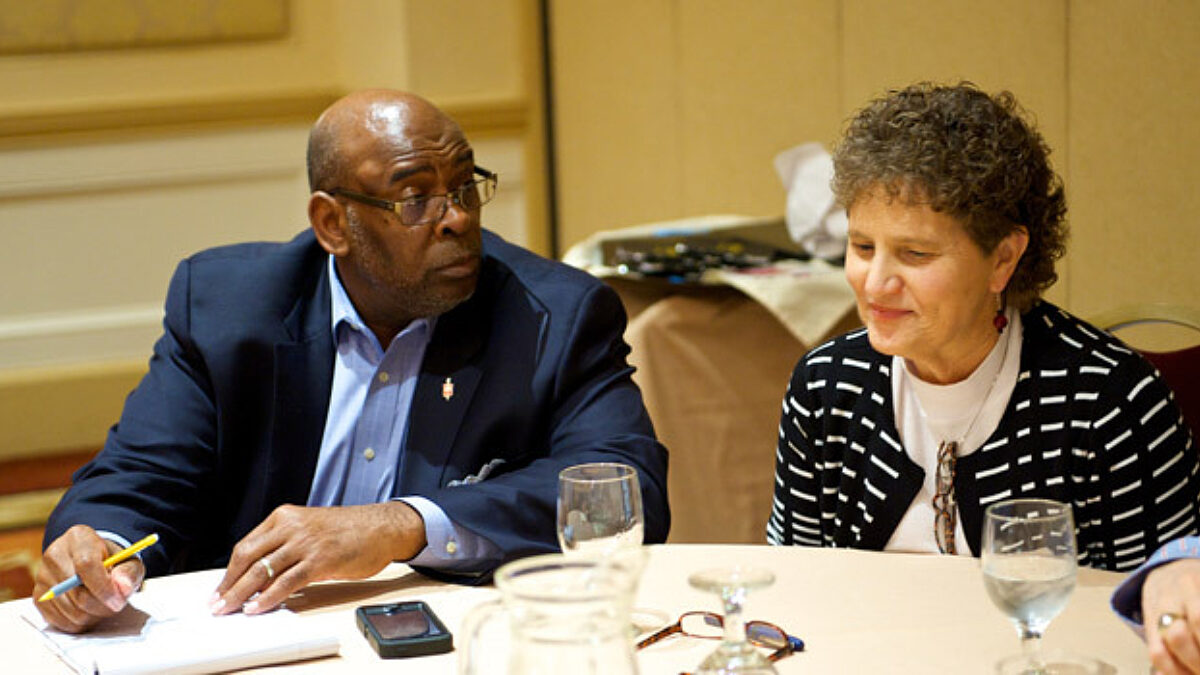
SEJ bishops, lay leaders dialogue about transformational leadership in UMC
By Jessica Brodie
CHARLESTON—When the Southeastern Jurisdiction College of Bishops gathered for their meeting Jan. 5-8, they got a unique opportunity to do an extended networking dialogue session with annual conference lay leaders.
The bishops and lay leaders—including S.C. Resident Bishop Jonathan Holston and S.C. Conference Lay Leader Barbara Ware—met for three hours Jan. 7 at The Mills House Wyndham Grand Hotel in Charleston to discuss cultivating vital transformational leadership to help The United Methodist Church.
Normally, the two groups network for a much shorter time period, but the lengthier session allowed them to dialogue about the role of bishops and conference lay leaders in prompting change. The session was facilitated by Craig Robertson of Spiritual Leadership Inc.
Advocacy for children in poverty was a big part of the dialogue. Florida Conference Bishop Ken Carter said sometimes a shared cause is a major mobilizer.
“If leaders and the bishop could align themselves along a common focus…it would do a lot of good,” Carter said.
Many felt children in poverty can be that common focus, and they spent time discussing what each conference could do to help.
Holston said it is important to figure out a way to make advocacy for children in poverty a priority.
“If it is important enough for the church to craft a way forward together, I believe we can find a way … and discover what God can do with us and through us,” Holston said.
The leaders also discussed what their role is able to offer in creating change. Bishops and lay leaders each shared real-world ways they are able to prompt change in their annual conferences, from how to identify new leadership, to the importance of smaller clusters, to events like the Bishop’s Road Show in the S.C. Conference.
“You’ve got to be open to change,” Ware told peers during the discussion, noting how her team came up with the idea for a Mission Fair at last year’s Annual Conference and ran with it. “We need to empower our lay leadership and help them take ownership.”
Other leaders noted the importance of being true partners with their bishop, developing new spiritual leaders in the conference, reaching out to young adults and more.
Several bishops dialogued about the need for shared leadership, communication and losing what is often called “hero leader syndrome,” where leaders sometimes feel they are the sole knight in shining armor who must swoop in and save the day, lest everything fail.
The Resident Bishop of the Virginia Conference, Young Jin Cho, said it is also important for people to understand who is in charge of discerning God’s vision for the annual conference.
“Equipping and connecting are key works for connectional ministry,” Cho said.
The group discussed what Robertson called “the mix”: energy, control, perspective, gifts, relationships, momentum, ability to learn, wisdom, skills and credentials.
“We’re trying to improve the United Methodist Church in every way, shape and form,” Robertson said. “Our ability to learn from our mistakes has to go up.”
Spouses, COE also gather
In addition to the networking session, the College of Bishops had several days of intensive meetings both with each other and with the Committee on Episcopacy. The lay leaders and COE also met individually for learning, sharing and visioning.
Bishops’ spouses also shared a time of learning and fellowship over the four days. In addition to touring the historic city of Charleston, including enjoying popular destinations such as the ancient Angel Oak tree, Magnolia Gardens and Charleston Tea Plantation, they also visited Rural Mission on Johns Island. Run by Linda Gadson, the mission initiative of the United Methodist Women has ministered since 1954 to the faith and human needs of the very low-income migrant and resident families in the rural coastal Sea Islands.
They also visited local churches, such as Bethany UMC, Summerville.
One of the highlights of the four-day event was the community dinner, held Wednesday evening and welcoming the spouses, bishops, lay leaders and COE members, plus S.C. Conference district superintendents and others in key leadership positions in South Carolina.
For more information on the SEJ and the SEJ College of Bishops, visit www.sejumc.org. The SEJ gathers for Jurisdictional Conference every four years the summer after General Conference, and elects new bishops, among other business. The next conference will begin July 13, 2016, at Lake Junaluska, N.C.